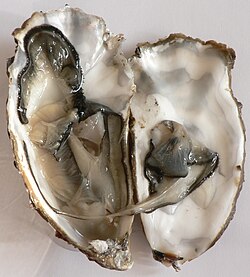austere
Jump to navigation
Jump to search
English
[edit]Etymology
[edit]From Ancient Greek αὐστηρός (austērós, “bitter, harsh”), having the specific meaning "making the tongue dry" (originally used of fruits, wines), related to αὔω (aúō, “to singe”), αὖος (aûos, “dry”).
Pronunciation
[edit]- (Received Pronunciation) IPA(key): /ɒˈstɪə(ɹ)/, /ɔːˈstɪə(ɹ)/
- (General American) IPA(key): /ɔˈstiɹ/, enPR: ôstēr′
- (cot–caught merger) IPA(key): /ɑˈstiɹ/
Audio (US): (file) - Rhymes: -ɪə(ɹ)
Adjective
[edit]austere (comparative austerer or more austere, superlative austerest or most austere)
- Grim or severe in manner or appearance.
- The headmistress was an austere old woman.
- Synonyms: stern, strict, forbidding, ascetic
- Lacking decoration; trivial; not extravagant or gaudy.
- The interior of the church was as austere as the parishioners were dour.
- Synonyms: simple, plain, unadorned, unembellished
- Antonyms: overwrought, flamboyant, extravagant, gaudy, flashy
Derived terms
[edit]Translations
[edit]grim, stern, strict
|
not extravagant
|
Italian
[edit]Pronunciation
[edit]Adjective
[edit]austere
Latin
[edit]Pronunciation
[edit]- (Classical Latin) IPA(key): /au̯sˈteː.re/, [äu̯s̠ˈt̪eːrɛ]
- (modern Italianate Ecclesiastical) IPA(key): /au̯sˈte.re/, [äu̯sˈt̪ɛːre]
Adjective
[edit]austēre
References
[edit]- “austere”, in Charlton T. Lewis and Charles Short (1879) A Latin Dictionary, Oxford: Clarendon Press
- “austere”, in Charlton T. Lewis (1891) An Elementary Latin Dictionary, New York: Harper & Brothers
Latvian
[edit]
Etymology
[edit](This etymology is missing or incomplete. Please add to it, or discuss it at the Etymology scriptorium.) Perhaps related to Ancient Greek ὄστρεον (óstreon).
Pronunciation
[edit]Audio: (file)
Noun
[edit]austere f (5th declension)
- oyster (certain edible bivalve mollusks of the order Ostreida)
- austeru zveja ― oyster fishing
- rīt austeres ― to swallow oysters
- austeru lasītāji un lasītājas tur brida kailām kājām ― male and female oyster collectors were wading there (= in shallow water) barefoot
Declension
[edit]Declension of austere (5th declension)
| singular (vienskaitlis) | plural (daudzskaitlis) | |
|---|---|---|
| nominative (nominatīvs) | austere | austeres |
| accusative (akuzatīvs) | austeri | austeres |
| genitive (ģenitīvs) | austeres | austeru |
| dative (datīvs) | austerei | austerēm |
| instrumental (instrumentālis) | austeri | austerēm |
| locative (lokatīvs) | austerē | austerēs |
| vocative (vokatīvs) | austere | austeres |
Middle French
[edit]Etymology
[edit]Adjective
[edit]austere m or f (plural austeres)
Old French
[edit]Alternative forms
[edit]Etymology
[edit]Adjective
[edit]austere m (oblique and nominative feminine singular austere)
Categories:
- English terms derived from Ancient Greek
- English 2-syllable words
- English terms with IPA pronunciation
- English terms with audio pronunciation
- Rhymes:English/ɪə(ɹ)
- Rhymes:English/ɪə(ɹ)/2 syllables
- English lemmas
- English adjectives
- English terms with usage examples
- Italian 3-syllable words
- Italian terms with IPA pronunciation
- Rhymes:Italian/ɛre
- Rhymes:Italian/ɛre/3 syllables
- Italian non-lemma forms
- Italian adjective forms
- Latin 3-syllable words
- Latin terms with IPA pronunciation
- Latin non-lemma forms
- Latin adjective forms
- Latvian terms with audio pronunciation
- Latvian lemmas
- Latvian nouns
- Latvian feminine nouns
- Latvian terms with usage examples
- Latvian fifth declension nouns
- Latvian noun forms
- Latvian non-alternating fifth declension nouns
- lv:Bivalves
- lv:Seafood
- Middle French terms borrowed from Latin
- Middle French terms derived from Latin
- Middle French lemmas
- Middle French adjectives
- Old French terms borrowed from Latin
- Old French terms derived from Latin
- Old French lemmas
- Old French adjectives
